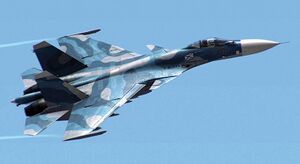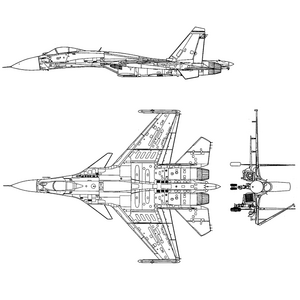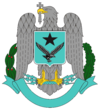NSF-13 Folgorazione Strike Fighter
| Casati NSF-13 Folgorazione | |
|---|---|

| |
| Painted in CRAF Colors | |
| Role | Multirole fighter aircraft |
| National origin | |
| Manufacturer | Casati Aircraft Corporation |
| First flight | 10 February 1997 |
| Introduction | 3 March 1997 |
| Status | In active service |
| Primary user | |
| Produced | 1998—Present |
| Number built | 292 |
| Unit cost |
ɫ64,500,000
|
The Casati NSF-13 Folgorazione (Flash or Electrocute) is a twin-engine all-weather supersonic carrier-capable jet fighter that was developed by Casati Aircraft Corporation in the 1990s. It featured improved avionics for supermaneuverable flight as well as advanced fire-controls systems on par to that over other comparable fighters of the time. In comparison to its predecessors, the NSF-13 has a strengthened undercarriage and structure, folding wings, and stabilators for better performance in carrier operations.
Development
Research and development of the NSF-13 began in the early 1990s as an upgrade to the aging NSF-12 of the early 1970s. It was planned to incorporate numerous upgrades and breakthroughs that had been discovered since the launch of the NSF-12. Most of these changes included a better propulsion designed to provide the newer NSF-13 with greatly enhanced agility as well as a new radar and a digital fly-by-wire flight control system in an all new glass cockpit layout.
As it was primarily designed to be a carrier-based aircraft, the NSF-13 was given the capability to carry a varying combat payload that included air-to-air and air-to-surface weapons on twelve hardpoints. The Folgorazione was also the first serialized aircraft in Cacerta's Armed Forces to possesses thrust-vectoring technology.
Production
Full-scale production of the NSF-13 began in 1998 to replace the NSF-12. Many of the original Folgoraziones served aboard the Queen Enza carriers until their retirement in 2009. They would later be moved to the newer King Doriano class where many are still stationed today. Due to their cheap cost, they are seen as an effective alternative to their far more expensive successors.
Production Figures
Approximately 292 NSF-13s have been completed and are in active service.
Design
The NSF-13 was designed with enlarged control surfaces to provide increased lift and maneuverability at the low speeds required for landing and taking off of the surface of an aircraft carrier. A strengthened undercarriage and canards also allow the Folograzione to perform quick descents and non-flared landings. Its wings and stabilators possesses the ability to fold in order to maximize the number of aircraft that a carrier is able to accomodate.
With twelve outer hardpoints, the NSF-13 is capable of carrying a wide array of weapons. This allows the fighter to specializes its outfit to any impending situation with an armory that includes unguided rockets, cluster bombs, and air-to-air missiles. Equipped with an advanced radar system, the NSF-13 has the ability to operation both night and day during operations at sea.
Operational History
The NSF-13 saw limited combat during the Nalayan Civil War.
Specifications
General Characteristics
- Crew: 1
- Length: 21.9 m (72 ft 9 in)
- Wingspan: 14.7 m (48 ft 3 in)
- Height: 5.9 m (21 ft 1 in)
- Wing Area: 62.0 m² (667 ft²)
- Empty Weight: 18,500 kg (40,790 lbs)
- Loaded Weight: 25,000 kg (55,115 lbs)
- Max Takeoff Weight: 35,000 kg (77,162 lbs)
- Powerplant: 2 x Cas-NSF13-98 Turbofans
- Fuel Capacity: 10,300 kg (22,711 lbs)
Performance
- Maximum Speed: Mach 2+ (2,600 km/h, 1,560 mph) at altitude
- Cruise Speed: 1,800 km/h (1,118 mph)
- Service Ceiling: 18,000 m (59,055 ft)
- Rate of Climb: 350 m/s (68,900 ft/min)
- Wing Loading: 360 kg/m² (79.4 lb/ft²)
- Thrust/Weight: 1.19
Armament
- Guns: 1 x 30 mm cannon with 150 rounds
- Payload: 8,000 kg (17,646 lb) on 14 external hardpoints (2 wingtip, 10 underwing)

